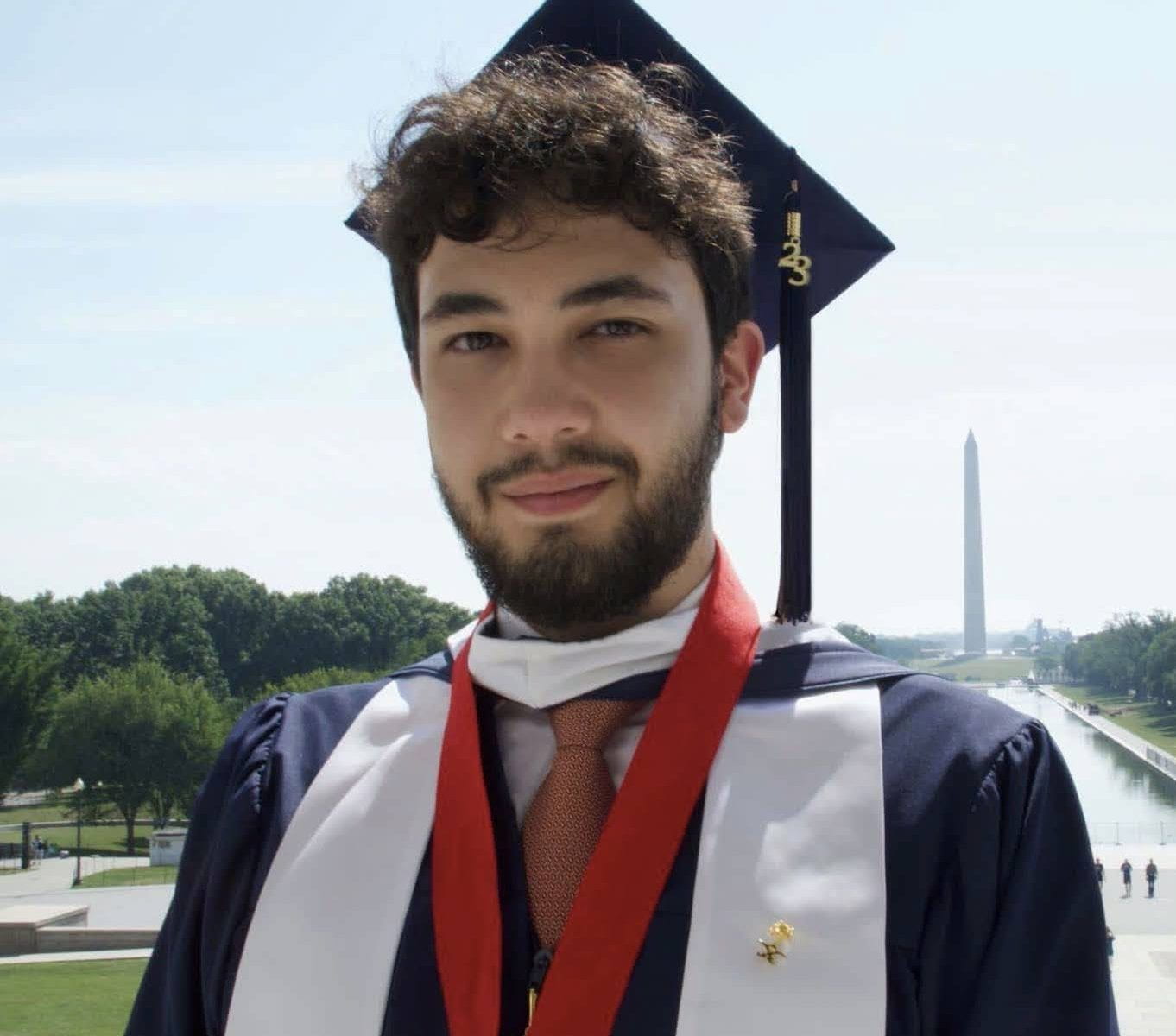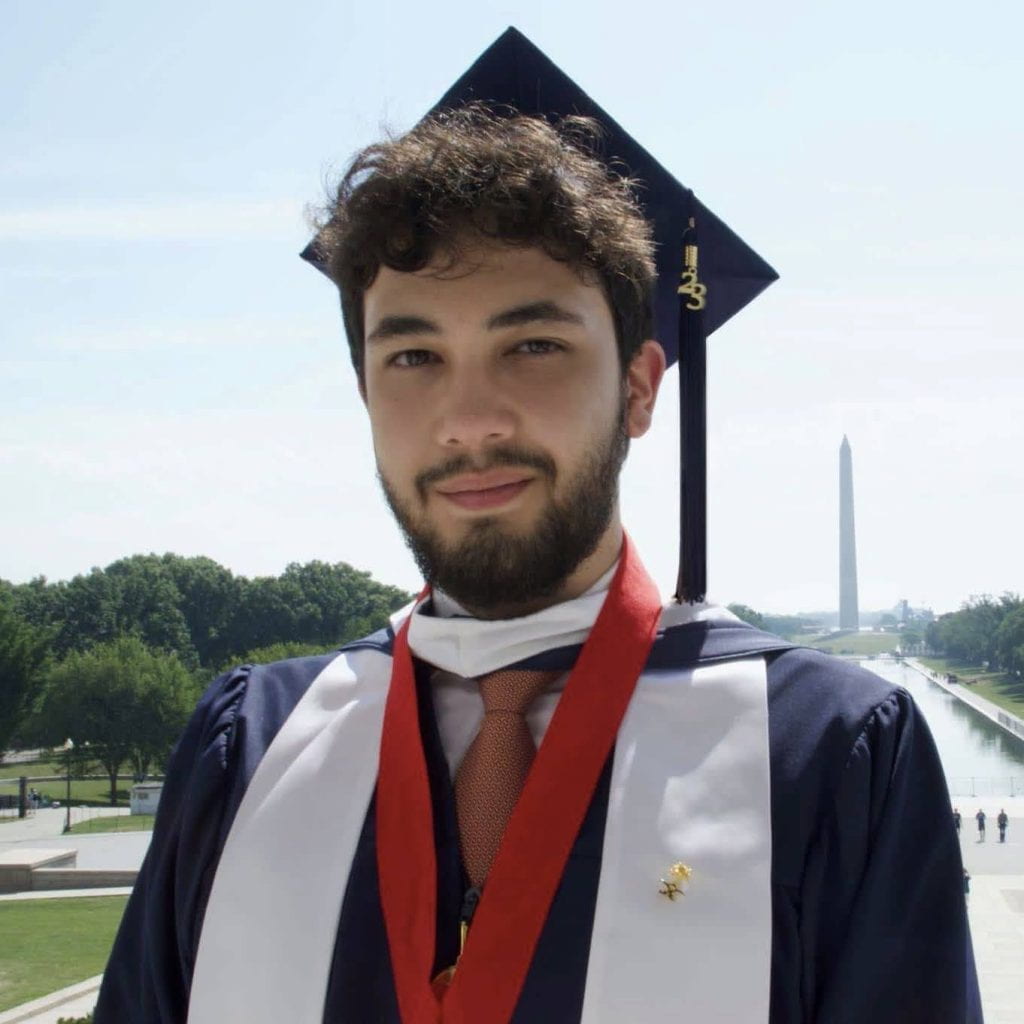Q&A with Andrew Tomusiak B.A. ‘24

Tell us about your story, and what motivated you to apply to the Rhodes Scholarship?
I found my inspiration to study peace and conflict in the memoir of Lt. Gen. Romeo Dallaire, the UN Force Commander during the Rwandan genocide. My shock at how the world failed to protect human life in Rwanda inspired me to work in conflict prevention and seek out the convergence in US foreign policy between our national interests and the betterment of humanity. Working as an analyst in the Policy Directorate at the State Department’s Office of Foreign Assistance Oversight over the last year has given me insight into how we can synchronize our instruments of national power to pursue this convergence, as well as the pitfalls that can undermine it. In the wake of the shutdown of USAID, I think the US should take advantage of an opportunity to rethink how we approach policy towards developing and conflict-affected countries with the benefit of decades of hindsight, and I want to gain world-class skills that will allow me to better contribute to this next chapter. Collaborating with British diplomats at State showed me how important and effective the US/UK partnership can be, and I want to bring home lessons from Britain’s top scholars and researchers about the country’s experience with merging its own diplomatic and development offices just five years ago.
Can you describe the degrees and skills you’ll be pursuing at Oxford, and what led you to them?
Two essential characteristics of successful policy that I have learned at the State Department are feasibility and suitability, which requires an ability to both design policy that achieves the goals you want it to and create the environment in which that policy can thrive. To develop these abilities, I sought out programs with a combination of professional competencies, theoretical backing, and research skills that would allow me to examine what I learned in government and prepare me to return to public service armed with skills to meet the moment. Oxford’s Master of Public Policy combined with its MSc in Global Governance and Diplomacy is the ideal combination to accomplish these goals and learn from a highly international and experienced student base. For my MSc dissertation, I hope to work towards building an evidence-based framework for the future of development assistance in fragile states.
How did your time at GW shape your journey? Looking back on your GW experience, what courses, mentors, or opportunities have had the biggest impact on your growth?
What drew me to GW and to the Elliott School was the opportunity to study and work with brilliant, hard-working faculty and students who are dedicated to both building new knowledge and translating that knowledge into concrete change in the world. Though I could list dozens of excellent courses, Peacebuilding and Stabilization (Jason Ladnier), Transitional Justice (Elvira-Maria Restrepo), and Wartime Governance in Afghanistan (Muqaddesa Yourish) very effectively bridged this gap between scholarship and practice in a way that inspired and focused me. Additionally, the Dean’s Scholars Program at Elliott (Alexander Cromwell, Maryam Deloffre) was a fantastic introduction to graduate-level research methods and has been a foundational part of how I will approach my dissertation under the Rhodes.
What other parts of the Rhodes experience are you looking forward to?
Aside from the incredible academic opportunities and talented people I will meet, I am really looking forward to getting out into the English countryside! I want to try renting a narrowboat to steer through the locks of the Oxford Canal, hike Scafell Pike, England’s tallest peak, and ride my bike from town to town, getting a feel for the place at the local pubs. I am also thrilled to explore Oxford’s cavernous Bodleian Libraries and get engaged with the university’s excellent research centers, including the Institute for Ethics, Law, and Armed Conflict, Changing Character of War Centre, and Oxford Human Rights Hub.
What advice would you give current GW students who aspire to opportunities abroad?
Firstly, I would say don’t count yourself out. The personal drive, capacity for hard work, and concern for human causes that is disproportionately represented among GW students is a key part of what scholarships like Rhodes are looking for, and your energy will show and distinguish you if you let it. To help with this, the Center for Undergraduate Fellowships and Research, led by Dr. Jacob English, is a tremendous resource to help you identify opportunities that match your interests, think deeply about your “why,” and prepare for national competitions. Secondly, I would say that these opportunities often select for well-roundedness, a trait that GW students have a comparative advantage in developing. The more lenses you can add to your perspective, whether from academia, government, civil society, volunteer organizations, the military, and more, the stronger ability you will have to identify complex problems and contribute to their solutions. Finally, while having a clear personal narrative is important, don’t allow that narrative to control you and consign you to one path. Find room to surprise yourself, build meaningful relationships, and learn things you never expected to.
How has your military experience influenced your academic interests and your approach to leadership, both at GW and as you prepare for Oxford?
The Army, and my experience as a cadet through Georgetown Army ROTC, has played an instrumental part in my career direction and personal outlook. The Army is fundamentally a people business, and no other organization I have been a part of has forced me to think so deeply about the nuanced dynamics of working in and building teams. One of the first things you learn in training to be an officer is that leaders are “responsible for everything the unit does or fails to do.” At the same time, officers generally enter their first assignments as the youngest and least experienced in the unit. Learning to lead under these conditions is a transformative personal development experience that has led me to focus on ownership, humility, and flexibility as cornerstones of leadership. It has also taught me valuable lessons about working in large organizations, including bureaucratic function and dysfunction, defining goals at the strategic, operational, and tactical levels, and reconciling the interests of your organization with those at echelons above and below you. While in the UK, I hope to continue my service by working at the Joint Analysis Center at RAF Molesworth and learn how intelligence cooperation strengthens our national security while supporting the US/UK partnership.
Read More about Andy Tomusiak and the Rhodes Scholarship



